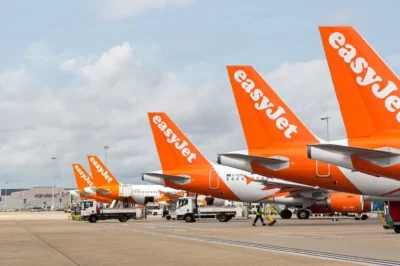easyJet could shrink its fleet by 56 aircraft by 2023 – but Stelios still isn’t happy
Links on Head for Points may support the site by paying a commission. See here for all partner links.
Whilst Sir Stelios Haji-Ioannou continues to threaten easyJet’s non-executive directors with the sack, the board is quietly pursuing alternate arrangements to secure the company’s future.
On Thursday easyJet released its H1 Trading Update, which included some information on how the company will manage its outstanding $4.5 billion order for 107 Airbus A320-family aircraft.
Whilst Stelios wants to cancel the order entirely on the basis of ‘force majeure,’ the easyJet board argues that it doesn’t actually have the ability to do so.

(Stelios does not necessarily disagree with this, but counters with the fact that ‘trying it on’ would, given the inevitable lawsuit and appeal, give easyJet a five year breathing space even if it loses.)
It also said the company would be on the hook for “significant” compensation based on the volume discount it received on the original 135-aircraft order. With 45 of the planes already delivered it would have to pay a penalty for not taking the remainder and forfeit the negotiated discount on those it is already operating.
easyJet’s new fleet plan
With outright cancellation seemingly off the table, the board’s plan is to defer the arrival of 24 (potentially 29) aircraft between now and April 2023. Airbus has already agreed to this as it struggles with its own corona-related production delays.
That means that easyJet will not receive any new planes in 2021, although it is still set to take six aircraft this year.
Furthermore, easyJet has some flexibility with another 24 aircraft which are coming to the end of their leases in the next 16 months. Depending on how the airline industry recovers it may choose to drop these aircraft too.
This would potentially take the minimum number of aircraft the airline expects to operate by September 2023 down to 281. The current number is 337. This is not all that far off from the Stelios target fleet of 250 aircraft.
easyJet has also secured additional funding, on top of its £600m Government loan, that should provide it with enough cash to ride out a nine-month grounding of its fleet.
Stelios still isn’t happy
Stelios is still unsatisfied. In response to the new fleet proposals he has called for the removal of “scoundrel” easyJet CEO Johan Lundgren and board chairman John Barton. Whilst the company has deferred some of its deliveries, Stelios still claims the company is paying Airbus “at least” £2.5bn over the next two years which is money it can ill afford.
With Stelios and his family controlling 34% of the shares, Lundgren and Barton would need 76% of the remaining potential votes if they were to survive.



 Rob
Rob 





Comments (49)